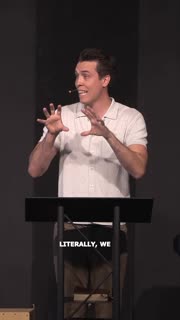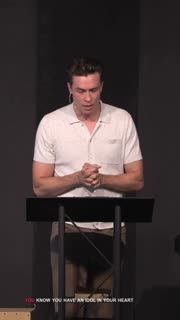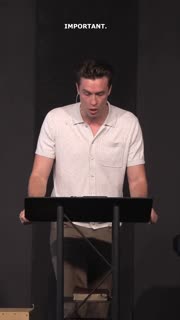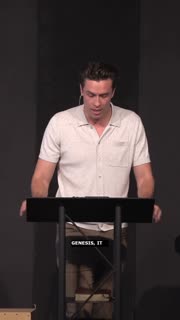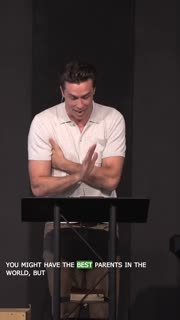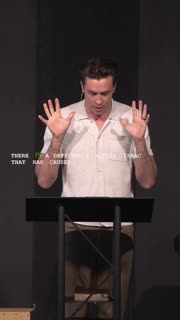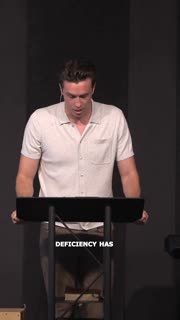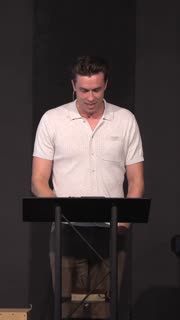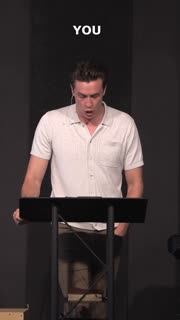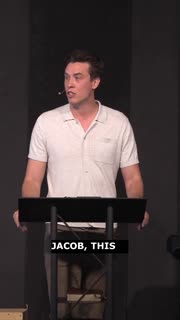Breaking Generational Cycles: From Unblessedness to Blessing
Devotional
Sermon Summary
Bible Study Guide
Sermon Clips
### Quotes for Outreach
1. "So quite literally, we pass on our sin and our suffering to our kids on a genetic level. That's what the hard science is telling us. And science is finally catching up with the Bible, because this is simply what the narrative of Genesis demonstrates to us." [00:58] (19 seconds)
2. "You know you have an idol in your heart when you justify sinning in order to get it. You make excuses to sin in order to acquire that thing, protect that thing, and preserve that thing." [14:21] (18 seconds)
3. "Parents' words are so important. What a father speaks over a son and a daughter will shape them for the rest of their life. It will alter who they become." [23:03] (9 seconds)
4. "You know, Genesis, it shows that history repeats itself. We are not okay. We are dysfunctional. We have these massive gaping holes in our heart and we try to fill it with people and things and it causes us to create so much collateral damage around us and hurt ourselves in the process." [41:04] (21 seconds)
5. "You might have the best parents in the world, but I'll tell you this, the most well-meaning parents are still gonna wound you. The most well-meaning parents are still going to let you down. No greater good is done to us than by our own families and no more harm is done to us than by our own families." [36:38] (18 seconds)
### Quotes for Members
1. "There is a deficiency within Isaac that has caused him to love others on the basis of what they do for him. And the tragedy, like the collateral damage of this kind of love in a family is when you love other people, you love them. You love people like this. The person on the other end of that kind of transactional love begins to believe that they're only as good as what they can give." [07:48] (22 seconds)
2. "Rebecca's deficiency has caused her to treat Jacob as if he is the blessing. She, like Isaac, her husband, has projected her need for blessing onto another, onto her son, Jacob." [13:23] (15 seconds)
3. "So we, just like Isaac, Rebecca, Esau, and Jacob, we live with a deficiency from not being blessed. And it started generations before us. The blessing we did not receive was never even given to our parents. And so we ache for blessing. There's this primal need for that blessing. Without it, we struggle." [35:25] (22 seconds)
4. "You will unconsciously pass down unblessing if you exist in a state of unblessing. If you've never have kids, you know what? You're gonna transmit your pain to me. And I'm gonna transmit your pain to you. And I'm gonna transmit it to my kids. The cycle doesn't stop. We all take part in it. We live in a web of human relationships." [38:03] (22 seconds)
5. "So here's Jacob, this unblessed son who needs you. Who needs you. He needs blessing. And downward from heaven comes that blessing. God announces that he, God, is the God of Abraham, Isaac, and Jacob. That's purposeful. It's like God is stepping into the generations. He's stepping into this line of breakdown and saying, I am intervening and I will keep my promises and I am with you. I will bless you and you will be a blessing." [40:29] (33 seconds)
Ask a question about this sermon
1. "So quite literally, we pass on our sin and our suffering to our kids on a genetic level. That's what the hard science is telling us. And science is finally catching up with the Bible, because this is simply what the narrative of Genesis demonstrates to us." [00:58] (19 seconds)
2. "You know you have an idol in your heart when you justify sinning in order to get it. You make excuses to sin in order to acquire that thing, protect that thing, and preserve that thing." [14:21] (18 seconds)
3. "Parents' words are so important. What a father speaks over a son and a daughter will shape them for the rest of their life. It will alter who they become." [23:03] (9 seconds)
4. "You know, Genesis, it shows that history repeats itself. We are not okay. We are dysfunctional. We have these massive gaping holes in our heart and we try to fill it with people and things and it causes us to create so much collateral damage around us and hurt ourselves in the process." [41:04] (21 seconds)
5. "You might have the best parents in the world, but I'll tell you this, the most well-meaning parents are still gonna wound you. The most well-meaning parents are still going to let you down. No greater good is done to us than by our own families and no more harm is done to us than by our own families." [36:38] (18 seconds)
### Quotes for Members
1. "There is a deficiency within Isaac that has caused him to love others on the basis of what they do for him. And the tragedy, like the collateral damage of this kind of love in a family is when you love other people, you love them. You love people like this. The person on the other end of that kind of transactional love begins to believe that they're only as good as what they can give." [07:48] (22 seconds)
2. "Rebecca's deficiency has caused her to treat Jacob as if he is the blessing. She, like Isaac, her husband, has projected her need for blessing onto another, onto her son, Jacob." [13:23] (15 seconds)
3. "So we, just like Isaac, Rebecca, Esau, and Jacob, we live with a deficiency from not being blessed. And it started generations before us. The blessing we did not receive was never even given to our parents. And so we ache for blessing. There's this primal need for that blessing. Without it, we struggle." [35:25] (22 seconds)
4. "You will unconsciously pass down unblessing if you exist in a state of unblessing. If you've never have kids, you know what? You're gonna transmit your pain to me. And I'm gonna transmit your pain to you. And I'm gonna transmit it to my kids. The cycle doesn't stop. We all take part in it. We live in a web of human relationships." [38:03] (22 seconds)
5. "So here's Jacob, this unblessed son who needs you. Who needs you. He needs blessing. And downward from heaven comes that blessing. God announces that he, God, is the God of Abraham, Isaac, and Jacob. That's purposeful. It's like God is stepping into the generations. He's stepping into this line of breakdown and saying, I am intervening and I will keep my promises and I am with you. I will bless you and you will be a blessing." [40:29] (33 seconds)
